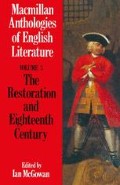Abstract
Crabbe was born in the fishing-village of Aldeburgh in Suffolk, about which he often wrote. After practising there as a doctor, he sought a poetic career in London, but was only rescued from destitution by Edmund Burke, who encouraged him to take orders and provide himself with security (he was not a very active clergyman). Burke helped him publish The Library (1781), and introduced him to members of The Club, notably Johnson, who gave advice on The Village (1783), a grimly realistic antidote to conventional pastoral poetry, which made his name. Following his marriage, he published little for twenty years, although he wrote and burned three novels. The Parish Register (1807) was followed by The Borough (1810), a descriptive and narrative poem based on Aldeburgh, including the tale of ‘Peter Grimes’, used for Benjamin Britten’s opera. Tales in Verse (1812) and Tales of the Hall (1819) were further collections of narratives. Although he wrote well into the Romantic period, Crabbe usually persisted with the heroic couplets of an earlier age, and offered unadorned views of nature: his conservatism found sympathetic responses in such admirers of the ‘Augustan’ manner as Byron and Jane Austen.
Preview
Unable to display preview. Download preview PDF.
Editor information
Copyright information
© 1989 Macmillan Publishers Limited
About this chapter
Cite this chapter
McGowan, I. (1989). George Crabbe. In: McGowan, I. (eds) The Restoration and Eighteenth Century. Macmillan Anthologies of English Literature. Palgrave, London. https://doi.org/10.1007/978-1-349-20143-3_39
Download citation
DOI: https://doi.org/10.1007/978-1-349-20143-3_39
Publisher Name: Palgrave, London
Print ISBN: 978-0-333-46478-6
Online ISBN: 978-1-349-20143-3
eBook Packages: Palgrave Literature & Performing Arts CollectionLiterature, Cultural and Media Studies (R0)

